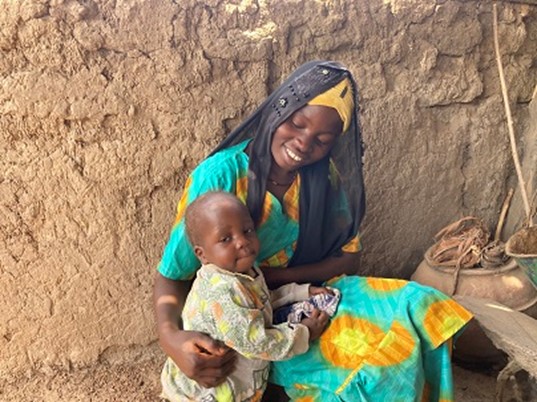Success Story
A Happy Mother Following Her Child’s Recovery from Severe Malnutrition
August 22, 2023
The NPI EXPAND Child Survival Activity project started implementing in the district of Ouéléssébougou, Mali in November 2022. One of the first activities carried out by project officers was mapping the Community Action Group for Nutrition (GSAN), identifying the groups that were functional, and revitalizing those that were inactive. GSAN are composed of community health agents and mothers from their villages. These community groups are instrumental in identifying malnourished children at an early stage so their cases can be treated before they develop severe malnutrition.
This was the case in the village Molobala. While the community groups had been established in 2017, activities stopped in late 2022 due to lack of support. With a population of 15,010, the village of Molobala is part of the Health Area of Ouéléssebougou Central. It is 24 km away from the central primary health clinic (CSCOM).
As a result of NPI EXPAND’s efforts, project partners provided resources and coaching to Molobala’s GSAN so they could fulfill their mandate of promoting nutritional awareness and healthy diets for young children. The GSAN then resumed operations and carried out nutritional demonstrations for mothers of young children. The project’s field agent worked hard to restart GSAN and resume activities through meetings with village authorities.
With support from NPI EXPAND, the Molobala’s GSAN resumed nutritional demonstration sessions and mass malnutrition screenings of children in January 2023. During those sessions, three children were diagnosed with moderate acute malnutrition and one with a severe case with complications: Mohamed, the child of Kadiatou Samaké.

Mohamed and his mother Kadiatou benefited from the revitalized GSAN in their community
The three cases of moderate malnutrition were referred to the CSCOM (community health center) and Kadiatou’s child to the CSREF (referral health center). The three children made the trip to CSCOM while the transfer of Kadiatou’s child to the CSREF was delayed because his parents couldn’t afford the treatment. GSAN members assisted Kadiatou and the family and, as a result, Mohamed was admitted to the intensive care unit for cases of severe malnutrition at the referral hospital.
This is how the field agent supervisor was able to observe the physical presence of the child and his mother at the CRSFR. The diagnosis showed that the child suffered from kwashiorkor, marasmus, anemia, and malaria. Despite this diagnosis, the child’s father wanted to go home with the child because he didn’t have the funds to pay for the treatment.
The field supervisor followed up on the child’s case and advocated to the nutrition officer at the CSREF to take care of the child. CSREF agreed with the supervisor’s request and the child was administered treatment free of charge.
Mrs. KEITA Safiatou Camara, the nutrition officer at the CSREF, noted:
“When the child arrived, we noticed that he was not well. We did tests that showed he was severely malnourished and had malaria. We then started treating him. After a week in the hospital, we saw a great improvement in his health.”
After a week of treatment, the child recovered from the critical phase and returned home on February 2, 2023. Mohamed’s mother Kadiatou said,
“I fed my 22-month-old child, Mohamed, from the family’s communal meal. Unfortunately, he gradually lost weight until he became ill. I found that his belly grew, he had sores in his mouth, his hair turned reddish, and his feet were swollen.
I had the chance to participate with my child in a nutrition demonstration session organized by the village GSAN with the support of the field agent of the USAID NPI EXPAND project. GSAN members screened the children, including mine. This is how they detected that my child was severely malnourished and referred us to the CSREF of Ouéléssebougou.
Thank God my child has been recovered and he is doing very well. I learned new recipes from the GSAN to continue feeding my child so he stays healthy.”
His continued care is being handled in the community by the GSAN. Mohamed was saved thanks to the combined efforts of NPI EXPAND field agents, GSAN members, and the public health facility staff.